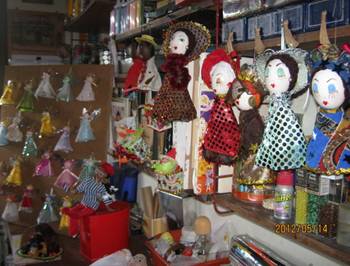
From girlhood, the happiest time of year for me was Christmas. Maybe because the general atmosphere that surrounded that date was happiness and relaxation. All the adults became friendlier, maybe because they received their “bonuses,” which generally equaled another month’s salary,making them more tolerant of the smallest and youngest of the family and of the neighborhood, who back then were like an extension of this.
I always observed with curiosity, but also with the naiveté of a girl, that my aunts and my mother, days before the key dates — Christmas and the day of the Three Kings — would restore old toys and dolls, cleaning them and making them new clothes, so that everything was shiny. I remember that one of my aunts made tin soldiers, which my grandfather later took charge of painting suitably. All this process of pouring the melted tin in the molds fascinated me, and I watched with delight. I never associated this busy workshop with anything but another chore, in a home where everyone was very hard-working. It was not until my cousin Ignacito, the most mischievous of us, approached me in secret and told me: “Cousin, the parents are the Kings. If you want to prove it, the night before stay awake like me to see my father dressed as a King, placing the toys around the Christmas tree.”
After he made this confession to me, I realized that these restored dolls and toys had become the property of other children in the neighborhood from families with fewer resources than ours.
I adored my cousin, he was my hero, and tried to follow him in all his antics. I joined him the night before the anticipated day. Trying to fight sleep, finally Morpheus overcame me before I could see my fantasy shattered. But now things would not bethe same, and in later years, I did not feel like leaving water and straw for the camels. Nevertheless, I do not know for what hidden reason, I continued believing and feeding that illusion for several more years.
I grew, and with my adolescence came the year fifty-nine. The first thing that I saw vanish was that pretty family that I had always so much enjoyed: my aunts and uncles and with them my cousins. That was a strange pain that I had never before felt, as if something was broken inside of me. Later my friends left. No more walks to window shop, no more scent of fresh pine in the doorways of the stores, no more garlands or toys. All that disappeared. I never again heard those Christmas carols and songs, not in the streets or on the radio, much less on television: they were replaced by marches or anthems.
For more than fifty years I longed to again hear a Christmas carol or song. This never happened. Nevertheless, this year, with the new boom in the small businesses and the ingenuity of the self-employed, we have spent the whole summer, until today, listening to the improvised ice cream carts, announcing themselves with music of carols, which evidently (because everyone has the same) have been incorporated, possibly with the music that comes with the garlands, which are sold at the currency raising shops — as we call the hard currency stores.
This has become something like that “you did not want soup, but you drink three bowls.” Nothing, that for more than half a century was a shortage, now has become an overdose. The only signs that it’s Christmas are those little carts and the paladares, the private restaurants.
Translated by mlk
December 8 2012
